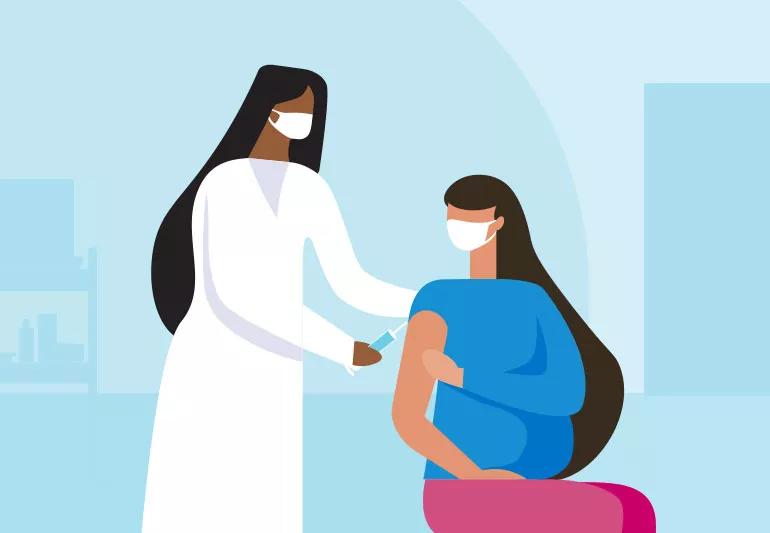Yes! Get a flu shot as soon as it’s available

Image content: This image is available to view online.
View image online (https://assets.clevelandclinic.org/transform/c5bb1272-d63f-48f8-b61f-4989b9587b54/doctor-giving-pregnant-woman-vaccine-1312293160-770x533-1_jpg)
Doctor givnig pregnant woman a flu shot.
You’re at high risk of complications from the flu during pregnancy. Yet only about 50% of people who are pregnant get a flu shot each year.
Advertisement
Cleveland Clinic is a non-profit academic medical center. Advertising on our site helps support our mission. We do not endorse non-Cleveland Clinic products or services. Policy
“If you’re pregnant, we recommend that you get a flu shot as soon it’s available, whether you’re in the first, second or third trimester,” says Ob/Gyn Oluwatosin Goje, MD.
Flu vaccines are not dangerous if you’re pregnant. Many large scientific studies not only support their safety in pregnancy, but they also show better outcomes for you and your fetus, including a lower risk of stillbirth.
Yet false reports about vaccine dangers once spread like wildfire. “The fears of vaccines causing miscarriage or autism were based on a few studies that were later declared fraudulent and recalled,” explains Dr. Goje.
The flu vaccine given during pregnancy doesn’t use a live virus. And if you’re concerned about thimerosal, a preservative used in the flu vaccine, a thimerosal-free vaccine is available.
Fears about the flu shot giving you the flu are also unfounded, Dr. Goje reports. Sometimes, though, your body has a short-lived immune response to the vaccine.
“Whatever happens in that short time is far preferable to getting full-blown flu in any trimester of pregnancy,” she stresses.
The risks of getting the flu itself are real for you and your fetus.
Dr. Goje explains that pregnancy brings changes to your respiratory system, heart, fluid volume and immune system. These make you much more likely to become severely ill — or die — from the flu.
Advertisement
You can also wind up with respiratory distress if you’re pregnant and catch the flu. “It’s a horrid situation,” she adds. “I’ve seen people with the flu who were put on life support and lost their fetuses in the ICU.”
However, the U.S. Centers for Disease Control and Prevention (CDC) notes that if you’re pregnant, getting the flu vaccine decreases the risk of severe infection and hospitalization.
In addition, if you are pregnant and live with a chronic disease — for example, sickle cell disease, diabetes or cardiovascular disease — or are immunocompromised, you’re at a higher risk for severe infection and possible hospitalization if you contract the flu. Getting vaccinated against it is especially important.
Research shows that people who get vaccinated and avoid the flu have healthier pregnancies.
“If you get the flu vaccine, you’re less likely to give birth to a baby that has birth defects or other problems,” says Dr. Goje.
Another big plus: The flu vaccine doesn’t only give the fetus immune protection in the uterus — for the first six months after birth, your baby is also protected.
“This is important because babies can’t be vaccinated until they are 6 months old; their immune systems are not developed enough,” explains Dr. Goje.
“The flu vaccine gives protection during and after pregnancy because you are less likely to get the flu when your baby is tiny.”
If you’re pregnant — whether you’ve had a flu shot or not — seek care right away if you develop any of these signs of flu:
“Call your obstetrician or primary doctor, or go to urgent care,” says Dr. Goje. “We are very liberal in treating pregnant people with antiviral medication at the first sign of flu. If the provider doesn’t offer, or hesitates to give you, an antiviral, be persistent — call your Ob.”
Dr. Goje stresses that other family members should also get flu shots, and recommends that you should avoid contact with those who are ill and wash your hands frequently.
So, don’t hesitate to get a flu shot if you’re pregnant — as early as possible.
“The myths you’ve heard about vaccines have put those at greatest risk of getting flu — including people who are pregnant — at huge jeopardy,” says Dr. Goje. “They rely on others to get vaccinated so there will be less influenza overall.”
Advertisement

Delivered every Tuesday!
Sign up for our Health Essentials emails for expert guidance on nutrition, fitness, sleep, skin care and more.
Learn more about our editorial process.
Advertisement
Talk with them about their new sibling early and often
Dental care is not only safe during pregnancy, but it’s also highly recommended
A healthy pregnancy diet includes good amounts of folic acid, DHA, calcium and more
Always talk with your doctor for advice, too
Healthcare providers recommend waiting until week 13 to dye your hair, just to be safe
There’s only one proven way to stack the deck in favor of a boy or a girl
Having a baby after a loss can bring unexpected emotions
Your second-trimester is usually the best time to travel
Type 2 diabetes isn’t inevitable with these dietary changes
Applying a hot or cold compress can help with pain
Pump up your iron intake with foods like tuna, tofu and turkey